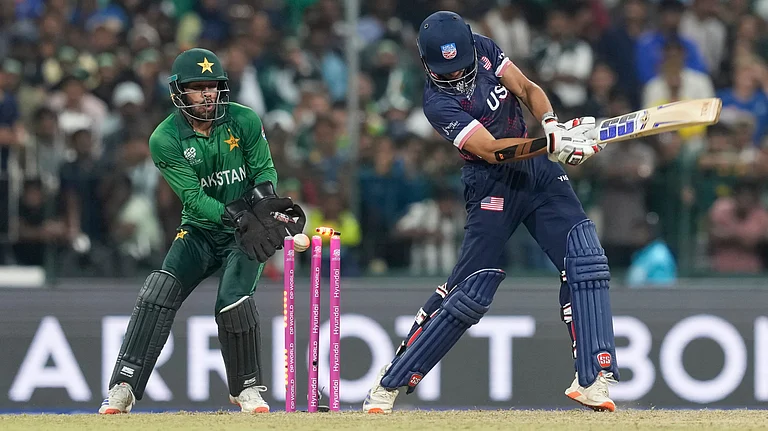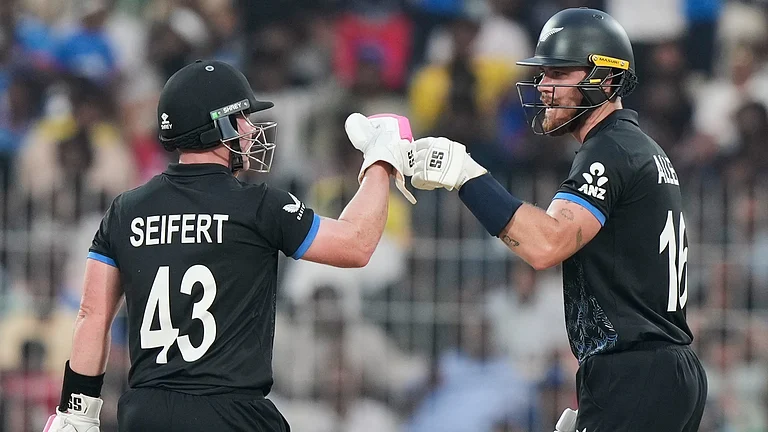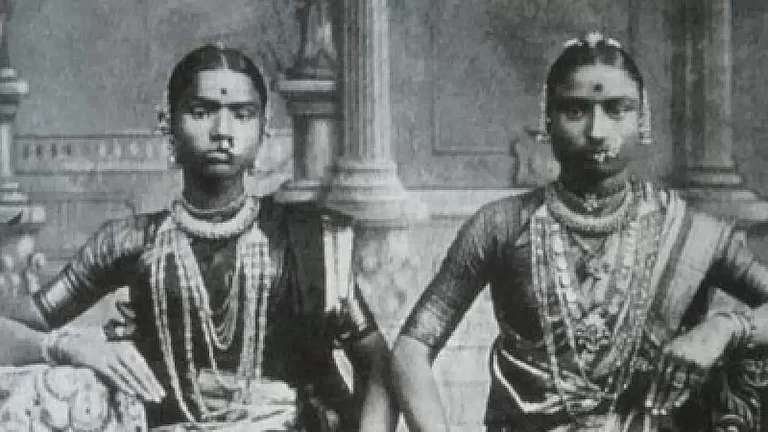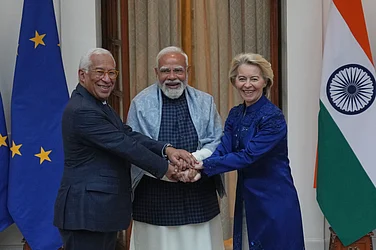NO one may have wanted these elections, but will they in retrospect prove to be something of a historical turning point? With the BJP now installed at the head of a government which is likely this time to survive at least longer than a fortnight, the question bears some reflection. The political convulsions of the late 1980s and early 1990s may have eased, but most of us have a sense that we are perched on the edge of major changes.
The reliable landmarks of our public life seem to have faded. And those who are supposed to make sense of this uncertainty—professional politicians, as well as pointy-headed academics and experts—seem as bemused and lost as the rest of us. Some warn of doom, others blithely celebrate the vitality of Indian democracy, still others duly foresee more of the same. In the face of these uncertainties, the resort to elections to do our collective thinking for us seems to have done little to resolve matters.
But this election has revealed once again, and with more force than before, tensions that have been inherent in the founding idea of India ever since 1947. These tensions have come to the fore as a consequence of 50 years of competitive politics and 12 general elections on a scale that has no historical comparison. The Indian State's commitment to democratic politics has transformed the texture of society; now, for the first time, there is a serious possibility that it may transform the architecture of the State itself.
The founding idea of India was committed to sustaining difference within a single, shared political frame. That idea is now under direct challenge from rivals who are currently yoked together in unlikely partnership. On one side stands the BJP, with its dreams of a simplified, homogeneous India squeezed into a single political frame. On the other is a shaky entity built out of the political debris cast up by the swelling tide of regional ambitions. This is committed to diversity, but it has a weak sense of India as a shared political space: it is interested in cultivating its own vernacular gardens, to a vision of diversity within many smaller political units.
The BJP has defined and built itself around a rejection of the founding conception of India. As its leaders accustom themselves to the gentle slope of Raisina Hill, will the party try to revise that idea in fundamental ways?
The BJP is now in government, but it is not in command. Its route to office has been littered with ironies. Not the least of these is that its leaders have had to spend more time on such nicely mundane subjects as the precise height of dams in southern India rather than concentrating on what they would consider more spiritually uplifting matters. It presides over a far more cacophonous coalition than the outgoing government, and it has no experience at all in conducting a choir of prima donnas. Further, as it tries to soften its declamations in order to satisfy new supporters, it is bound to face pressures from its old backers.
In some ways, the BJP seems to have acknowledged that what has delivered it into office is anything but a widespread, positive enthusiasm for its ideas (it has increased its share of the vote by about a fifth, but still has only a quarter of the total vote share). Rather, its present position is really the result of a rejection of the established political order. That rejection has taken different forms across the country—and the BJP has shown cunning in being able to capitalise on the split character of the vast majority of voters who actually opposed it.
The most evident sign of this rejection is the long-term fate of the Congress party, which has dominated national politics for most of the past five decades. After one of its most politically disastrous years in 1997, it gained a much-needed respite through Sonia Gandhi's remarkable campaign on its behalf—which pulled it from the brink of a fatal split. But this has been essentially a holding operation. One only has to notice what has happened to the party in Uttar Pradesh to realise the depth of its crisis. Uttar Pradesh has long been a crucible of Indian politics:homeland of the Congress since the 1920s, it has produced all but one of India's seven Congress prime ministers. Nehru, Indira Gandhi, Rajiv Gandhi all had their political backgardens here. Yet this election it has proved to be unable to win a single seat in the state, losing even what was universally reckoned to be its invincible bastion of Amethi.
One can hardly write the Congress off—it undoubtedly still has life in it, and historically it has always shown an extraordinary capacity to reinvent itself. It still continues to command a greater share of the national vote than any of its rivals, and is the only party that can claim a degree of support right across the country. But its shattered organisational structure will have to undergo massive surgery if it is to rise Lazarus-like again. The crisis of Congress represents much more than simply the crisis of a single political party. It raises wider questions about the possibility of any kind of national party—and those who aspire to replace it have good reason to study and learn from its experience.
The old Congress of Mahatma Gandhi and, after independence, of Nehru, stood for a plural definition of the Indian nation and it allowed for a constant expansion of such definitions through the operations of democratic politics. It was committed to a layered, open-ended and constantly revisable picture of Indian selfhood. It firmly avoided the alchemical sleights of hand that promised to distill a pure national essence—in this, it was quite contrary to current ideological attarwalas, who promise a fixed, heady scent of Indianess.
Its own success was, of course, built not just on a commitment to ideas, but on political support-building operations which drew together a broad spectrum of social groups, from across the many communities of caste, religion and language. The support of these vote banks was recruited by local Congress leaders and delivered to the national leadership through skillful balancing of local demands with wider concerns. An intricate and by no means internally stagnant social hierarchy was given representation through what was probably the most organisationally complex political party in world. But the social alliance which the Congress at once helped to form and on which it depended, has now dissolved.
ALLEGIANCES are no longer firmly anchored, and the result is often bewildering swings of support for parties from one election to another. The meltdown of political loyalties comes from what is nothing less than a profound social revolution, itself the product of 50 years of democratic politics. Intensifying electoral competition has drawn new groups into the arena, and politics of reservation have made available to them new forms of political self-definition—Dalits, BCs and OBCs are all now categories of political action. Most political parties have responded to these turbulent conditions by seeking to gather immediate gains rather than trying to build more durable bases of support.
This social revolution is essentially local in scope, and its differing effects are most clearly visible in the politics of the regional states of the Union. Throughout the 1990s, turnouts for elections to regional state assemblies have climbed steadily and significan-tly. No single social group accounts for this rise, but it is clear from data collected by the Centre for the Study of Developing Societies that the steadiest increases in participation have come from those lower in the social order, from the poor and illiterate. India's tribals and Dalits (who together account for around a fifth of the population), women, and the OBCs (who form a motley grouping, but are now more likely to vote as a group with a single interest), all are entering politics en masse.
As the least privileged rush to use their votes, those accustomed to being top of the heap are exiting. The economically better-off, the socially privileged and the educated remain powerful; but they are losing their political dominance and cultural influence. Numerically challenged, they are retreating from electoral politics. They are trying to regroup and maintain whatever public influence they can through channels like the media—it is there, rather than to the old professions of the law and politics, that the bright young things now turn.
INDIA'S newly politicised groups are using their votes at once to affirm identities and avenge past humiliations, as well as to secure immediate instrumental benefits. This is working important, but still little understood, changes in the character of political representation. In the past, what made a political representative trustworthy to his electors was his dissimilarity from them—that ensured both his ability and his neutrality. Ambedkar, in three-piece suit, bespectacled, clutching volumes of constitutional law, and speaking a honed English, incarnated a world far removed from those who supported him. But today, the aspiring politician must make every effort to display his commonality with the people whose votes he seeks—in dress, mannerisms, turns of phrase. Trust has become a matter of identity rather than of publicly verifiable performance. So long as you are 'one of us', I will vote for you—even if you are a criminal.
These new entrants are bringing to politics more local, tangible horizons of demand and action—and in that sense political conflicts are now more directly related to conflicts over resources. But the focus on specific local and regional issues has made it difficult to organise these groups on a wider basis—crucial for the emergence of national parties.
The downward pressure towards the local, towards forms of political organisation and presentation that have a restricted geographical base, has been reinforced by the liberalisation of central control of the economy since 1991. Reforms have handed real economic powers to state governments, and intensified struggles for access to them. This has generated a new kind of politics in the regions, quite distinct from that which prevailed in earlier decades. Then, regional groups tried to mobilise ethnic identities to push secessionist claims against a strong central State dominated by a national party. But with the decline of the Congress, the doors to the cabinet offices of New Delhi appear enticingly open. The new regional parties have been quick to secure a stake in national power—the experience of the United Front government has revealed to them their muscle power.
This time too, over 200 seats in the current Lok Sabha have gone to parties that have essentially local or regional support bases, and these parties have received almost half of the share of votes cast. They have thus established themselves as the vital material out of which our cut-and-paste governments, whether of the Left or Right, must be formed. These are the unlikely kingmakers in Indian politics: their leaders glow with the effects of 'it could be you' syndrome, as they await the call to ministerial office. In fact, it is increasingly difficult to maintain any sharp distinction between national and regional parties—they seem to be blurring into one another. After all, the aim of the regional parties is not to spirit power away from the central State, but to impose regional interests on New Delhi's agenda, and to use the central State to further these.
Set against this surge of the intensely local and particular into national politics is the BJP's political dream of a uniform, homogenised India. Can these rival conceptions be contained within a single, agreed idea of what India is? As the BJP prepares for government, it is being forced to recognise that the success of the old Congress as a national party lay in its acknowledgement of differences and in its coalitional capacities—not in declaiming doctrinal shibboleths.
The often contrary impulses of India's vast, federal democracy are imprinting themselves upon the ideological formulations of the BJP; most obviously in the form of the diverse interests represented by the politicians from the regions, each of whom will have to receive some satisfaction if the Hindu nationalists are to enter government. The BJP's more astute leaders as well as those within it, desperate to get their hands on power, realise that if the party is to usurp the role of Congress in the Indian political system, it will have to prove that in fact it is a sheep in wolf's clothing.
But one should not overestimate the BJP's capacities for change. The BJP remains the political outgrowth of an extremist religious movement—despite manifesting an eagerness to go hybrid, its roots unmistakably lie here. If it has a spell in government, it is bound to face strong internal demands to translate its hawkish manifesto into policy.
A BJP government will try to threaten the constitutional devices for protecting cultural pluralism: these need to be strenuously defended. In this task, the press has an important role to play. But even more importantly, the judiciary, in the form of the Supreme Court and the executive arms of our system, will have to show real vigilance towards the legislative manoeuvres of a BJP-led government.
HOWEVER, such a government is likely to put most of its aggressive energies into 'anti-Western' gestures. Swadeshi will require some sacrificial, Enron-like casualties, and there may be come macho posturing on subjects like exchange rates. But these gestures are unlikely to result in a serious diversion into economic protectionism—for liberalisation, and the discipline of the market, are recognised to be more powerful deities. More probably, this negative nationalism will be expressed in sabre-rattling against Pakistan and in threats to 'induct' the nuclear option—a threat which, used as a bargaining counter, might well form the nucleus around which the BJP policy with the United States will be built.
If the BJP is unlikely to entirely escape its political DNA, equally one should not place too much faith in the restraining effects of the political entrepreneurs from the regions. They are in politics for immediate gains, not to pursue exemplary careers built on principle; and some of them will readily submit to an injection of nationalist silicone if their regional measurements appear to be shrinking.
So far, divergent conceptions of India have proved able to cohabit within the original frame of the republic. This suggests that there is life still in the founding idea of India, precisely because it was never simply a commitment to abstract values or ideas—of secularism and democracy—but was rooted in a practical understanding of the compulsions and constraints of Indian politics. Late 20th century Indians, no more than their counterparts anywhere else, are not virtuous, moderate, principled or even especially tolerant people; they are deeply self-interested. But it is that self-interest, so apparent in the conduct of the political elite, which encourages them to make compromises and accommodations.
Look beneath the messy confusion and black arts of India's current politics, and one can see in its democratic experience evidence of something that James Madison and his Federalist colleagues saw well over 200 years ago. Large republics with diverse and conflicting interests can be a better home for liberty, a safer haven against tyranny, than homogeneous and exclusive ones. Within them, factions can check one another, moderating ideological fervour and softening power.
India's political experience over the last half-century could have been much more oppressive than it has in fact proved to be. When it gained independence in 1947, it was heir to an authoritarian colonial State, a profoundly hierarchical social order, staggering economic inequalities, and the potential for oppressive rule by a religious majority. All of these features continue to shape our politics. But they have in turn been reshaped by the presence of democracy. By enabling its citizens to mislike their rulers and to regularly vote them out, the constitutional democratic State has allowed Indians to live together with a larger measure of freedom than ever before and with more freedoms than citizens of other comparable new national States.
Most importantly, India's untidy democracy has been able to sustain internal diversity in more impressive ways than many other states. That achievement is set now to receive its severest test.
























